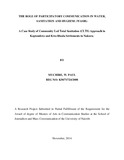| dc.description.abstract | Access to quality sanitation is precondition for good health and for success in the fight against
poverty and attainment of millennium development goals (MDG) on health. This study was
based in Kaptembwo and Kwa Rhonda, two low income settlements in Nakuru Municipality.
The areas, though somehow planned are faced with inadequate water and sanitation services,
amidst the increasing population pressure. This has been the situation, albeit the numerous
initiatives that have been implemented in the areas.
This study sought to investigate the role of participatory communication within the context of a
water, sanitation and hygiene (WASH) project that adopts the use of participatory approaches.
The study examined the Community Led Total Sanitation (CLTS) project being implemented in
the area since the year 2013. The study also sought to establish the level of expertise project in
terms of participatory communication amongst the staff implementing the CLTS, a major
determinant of project’s successful implementation.
This study collected primary data from the study area using the survey method. Being a
descriptive study, it used both qualitative and quantitative approaches, hence generating largely
qualitative and quantitative data. A total of eighty questionnaires were used to get data from the
beneficiary community. An additional eight self-administered questionnaires were used among
project staff and three key informant interviews targeting CLTs two trainers and a senior public
health official in Nakuru were conducted.
From the study findings, over fifty percent (50%) of the respondents indicated that the sanitation
condition in the area is good, an indication of happiness and satisfaction for a population whose
majority has lived in the area for over ten years. A big percentage has associate this to the CLTS | en_US |

